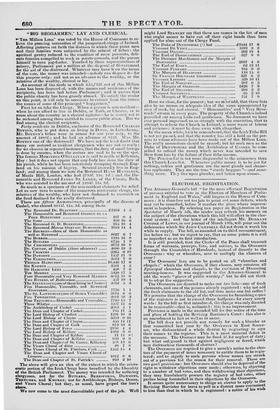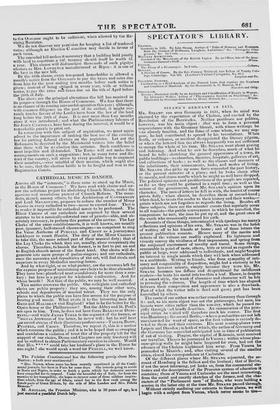ELECTORAL REGISTRATION.
THE Attorney-General's bill "for the more effectual Registration of persons entitled to vote in the Election of Members of Parlia-
ment in England and Wales," still lingers in the House of Com- mons : it is therefore not too late to point out some defects, which may yet he remedied, before it reaches the place where improve- ment is hopeless. By referring to a paper on Registration in the
Spectator of March 5th, the reader may refresh his memory on the subject of the alterations which this bill will effect in the elec- toral system ; and the letter of the intelligent Mr. DURRANT COOPER of Lewes, in our journal of March 19th, will point out the deficiencies which Sir JOHN CAMPBELL did not deem it worth his
while to supply. The bill, as amended on its third recommitment, lies before us; but we regret to say, that on some points it is still as imperfect as on its first introduction. It is still provided, that the Clerks of the Peace shall transmit forms of warrants, precepts, lists, and notices, to the Overseers through the Constables of Hundreds, instead of directly to the Overseers : why or wherefore, save to multiply the chances of error ?
The Overseers' lists are to be posted on all "churches and chapels ;" which the Overseers, if they choose, may construe all Episcopal churches and chapels, to the exclusion of Dissenting meeting-houses. It was suggested to the Attorney-General to add the words "places of public worship ;" but lie did not think fit to adopt the suggestion. The Overseers are directed to make out two lists—one of fresh claimants, and one of the persons already registered : why not add the fresh claimants to the old list, and thus make one list suffice ? We perceive that the charge of the Overseers for furnishing copies of the registers is not to exceed three halfpence for every ninety words : by the bill as first introduced, the charge was only directed to be reasonable—that is, unlimited : this is an improvement.
Provision is made in the amended bill for due notice of the time and place of holding the Revising Barrister's Court : this also is an amendment in fact as well as in name.
The bill does not provide any remedy for such a blunder as that committed last year by the Overseers in East Somer- set, who disfranchised a whole district by neglecting to sign their names to the register. This is a most material defect in the measure. The Overseer may be fined Si. for neglect of duty; but what safeguard is that against negligence or fraud, which may disfranchise thousands of electors? The Overseers are required to give a month's notice to the elec- tors of the payment of taxes necessary to entitle them to be regis- tered; and to signify to such persons whose names are struck out of a previous list the reason for their removal. These are two good provisions: but Overseers should also be deprived of the right to withdraw objections once made; otherwise, by objecting to a number of bad votes, and then withdrawing their objections, they may fraudulently procure the registry of bad votes, other parties being forestalled in their objections by the Overseers. It seems quite unnecessary to oblige an elector to apply to the Revising Barrister for leave to poll in a district more convenient to him than that in which he is registered : a notice of his wish to tla Overseer ought to he sufficient, when allowed by the Re- vising Barrister.
We do not discover any provision for keeping a list of tendered votes; although an Election C Jratuittee may decide in flivour of such votes.
The amended bill makes it necessary that a building held jointly with land to constitute a 10/. tenancy should itself be worth 5L
a year. This clause will disfranchise thousands of such pigstye electors as Mrs. LAWRENCE manufactured at Ripon : it is one of the best in the new bill.
By the 66th clause, every ten-pound householder is allowed a month's notice from the Overseers to pay the taxes and rates due from him for the year ending two mouths before such notice is given ; instead of being obliged in every year, with or without notice, to pay the rates alt. taxes due on the 6th of April before the 20th of July. The above are the principal alterations the bill has received in its progress through the House of Commons. We fear that there
is no chance of its coming into useful operation this year; although,
with common diligence on the part of its author, it might cer- tainly (under favour of the Lords) have been the law of the land
long before the 20th of June. It is now more than four months since it was introduced ; and what the Parliamentary labours of Sir JOHN CAMPBELL have been during the interval, it would be a remarkable puzzle to point out. In connexion with this subject of registration, we must again advert to the importance of making the best use of the existing
law for putting Liberal electors on the registries. Let not the Reformers be deceived by the Ministerial writers into the belief that there will be no election this autumn. Such confidence is most impolitic and ill-founded. The Tories will not make their arrangements on such a supposition; but, in every town and dis- trict of the country, will strive by every possible way to augment their numbers,—ever mindful of their maxim, which ought also to be ours, that the election battle is to be fought and won in the Registration Courts.



























 Previous page
Previous page